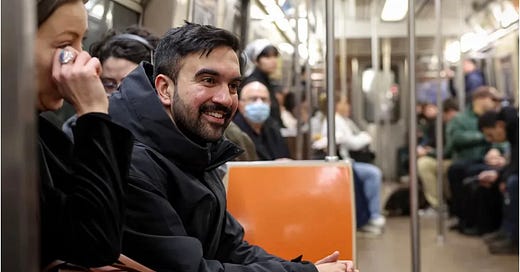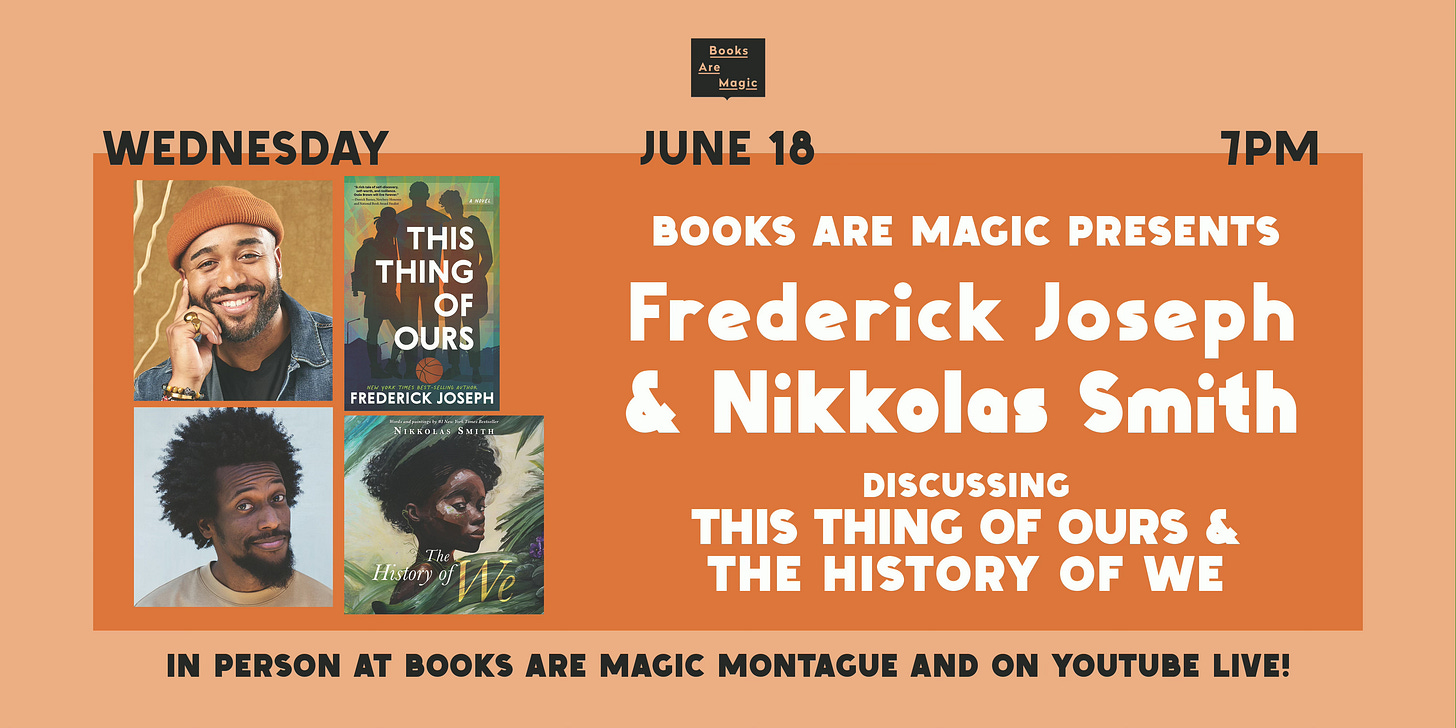Zohran Mamdani Could Redefine American Progressivism
How a Socialist Mayor in New York Could Ignite a National Progressive Revival

I won’t mince words: June 24th is Election Day in New York, and I am planning on ranking Zohran Mamdani as my number one choice in the race for Mayor of New York City, Brad Lander as my second, and I will not under any circumstance rank Andrew Cuomo at all. As he is a terrible person. Which I do not say that lightly. But rather with the full weight of memory: the mishandling of the pandemic, the abuse of power, the harassment and assault of countless women—some I know personally.
But my support of Zohran is not merely a rebuke of Cuomo. It is not even primarily about Cuomo, though the media will no doubt try to make it so.
No, my support of Zohran is born of something else. Something that will lead us toward a city where housing is decommodified, where every child has access to universal childcare, where public transit is free and green, where workers own the businesses they build, and where the budget reflects care over cages. Something closer to hope, but steadier.
It is rooted in the idea that New York City, this constant contradiction of a place, can still be governed with courage. That progressivism is not just a slogan on a poster or a bullet point in a campaign email. That we can mean what we say when we talk about housing as a right, when we talk about safety as something beyond carceral solutions, when we say the words climate justice and mean both the sea walls and the people most likely to drown behind them. A Zohran win would not just be a victory for Queens (where I have resided for nearly two decades) or the five boroughs. It would be a declaration. A line drawn. A chance to redefine what it means to build a country from the bottom up, starting right here. Starting now.
We are living in a nation on the edge of itself. The right continues to embrace a brand of politics that feels more like revenge than governance. The center, worn down by its own cowardice, clings to false balance and empty decorum. And the progressives and leftists? Ghostly movements at best. Which is why something as specific and local as the New York City mayoral race suddenly feels global. Feels cosmic, even.

New York has always been more than a city. It is a battleground of myth and machinery, of spectacle and survival. The subway is not merely transit—it is ritual and reckoning. The skyline is not merely architecture—it is ambition shaped from steel. And the mayor is not merely a position—it is a signal. To the nation. To the world.
When Franklin D. Roosevelt tested his social welfare strategies in Albany before the New Deal, when Koch wielded budget cuts like batons, when Giuliani criminalized poverty under the guise of cleanliness, it was never just about the five boroughs. It was about exporting a vision of what America should be, or more dangerously, what it should be willing to accept.
That is why Zohran Mamdani matters. His campaign does not exist in isolation. It is the latest node in a longer continuum of resistance and reinvention. Much like Harold Washington in Chicago, whose mayoral seat marked not only a political realignment but a moral one, or Bernie Sanders in Burlington, who showed that socialist governance was not fantasy but framework, Zohran stands as a rebuke to the old lies and a blueprint for new truths.
We are living in the wreckage of compromise. The afterlife of hope. Young people who once knocked on doors for Bernie or posted about mutual aid during the pandemic now move with a quieter kind of sorrow. They’ve seen what happens when movements are turned into mottos, when uprisings are turned into hashtags, when progress is papered over with performative platitudes from party elites. The erosion is not just ideological. It is spiritual.
And so the stakes of this moment cannot be overstated. The 2028 presidential election looms (potentially), shadowed by an ascendant right that does not care to govern so much as it seeks to dominate. In response, the Democratic center offers the same old managerial liberalism—order without justice, growth without equity, politics without soul. What Zohran offers is not just a pivot from that inertia—it is a rupture. A clean break. A return to the idea that government can be both just and competent, that radical imagination and institutional function do not have to be at odds.
This is not about dreams. It is about logistics. Free buses are not fantasy. They exist in Boston. In Kansas City. Childcare cooperatives are not utopian. They are already working in cities across the globe. Rent control is not a relic of the past. It is a tool, a lever, a life raft. Zohran’s platform does not live in the clouds. It lives in the block. In the walk-up. In the paycheck. In the MTA booth at the end of a long day.
And that, ultimately, is what makes this moment so volatile and so vital. Because when policy meets praxis, when slogans meet systems, the impossible becomes not only probable but necessary. Zohran Mamdani, as mayor, would not merely offer an alternative. He would offer evidence that progressives can win.
What also makes Zohran singular in this moment, this perilous and aching American moment, is not just the clarity of his platform but the integrity of his personhood. He is an immigrant, a socialist, an artist, and an activist. Each identity would be enough on its own to draw suspicion from the political establishment. Taken together, they form a profound challenge to the mythology of who gets to govern in this country. In Zohran, we do not find the familiar architecture of power, the kind built on pedigree cloaked in empathy or a resume crafted for comfort. Instead, we find something much rarer: a man who lives inside the very intersections that the future demands.
He is not supported by machines. He is supported by movements. His coalition is not formed in boardrooms but on the sidewalks of Queens, in WhatsApp threads between cab drivers, in union halls and community centers, in the hearts of organizers too tired to hope but still moving. His support does not come from venture capitalists but from mothers who know the price of rent. Not from party insiders but from the gig workers who make the city run and are offered no seat at its table. This is not just a campaign. It is a reflection of the city’s actual soul.
Then there is lineage. Zohran is the son of revolutionaries, born into a diasporic current that stretches from Kampala to Bombay to Jackson Heights. Within that current, he carries the memory of postcolonial struggle and anti-apartheid resistance, but also the quiet, uncelebrated dignity of immigrant toil. His candidacy does not simply suggest a change in local politics. It demands a reimagining of the American political imagination itself. He is not a deviation from leadership. He is what leadership has long refused to acknowledge.
In a city where newsrooms shape global narratives, where cable networks sit alongside subway tunnels, a Mamdani victory would force a shift in public perception. The mayor of New York City is not just a manager. The mayor is a message. If that message is carried by a Brown socialist with a MetroCard and a megaphone, backed by barbers and teachers and organizers rather than real estate moguls, then the media capital of the world will be forced to reckon with a new definition of power.
But the truth is, if Zohran Mamdani becomes mayor of New York City, it won’t be the end of anything, not the end of struggle, not the end of grief, not the end of the long American sentence we’ve been trying to rewrite since the first lie was printed as law. It would be, instead, the first full breath in a room we’ve been told to hold our tongues in. A room shaped like a borough. A borough shaped like a body. A body shaped like a future we still believe we deserve.
His victory would not be the finish line. It would be the streetlamp flickering on at dusk, a soft beginning. A humming. An answer not in theory but in flesh. You’d hear it in bodegas and mosques, on stoops and scaffolding. You’d feel it like subway wind before the train arrives. It would ring, not as anthem, not as slogan, but as a kind of whisper between neighbors who know what the fear of the first of the month. A kind of spell cast by organizers who’ve been told their labor doesn’t count. A kind of prayer for the country we still might become.
Because not all hope is hypothetical. Sometimes, it wears a Mets cap, rides the Q66, and gets things done. Not for the optics. Not for applause. But because someone has to mean what they say when they say: this city is ours. Because someone has to name what love looks like when it governs. Because someone has to prove that the progressives—tired, tender, teetering—can still win.
Come Hang Out Tonight
Nikkolas Smith and I will be in conversation at Book Are Magic in Brooklyn Heights. Come hang out!







I ranked him #1 when I voted on Sunday in early voting.
This is the hope I need to hear for when we beat and replace the facists!